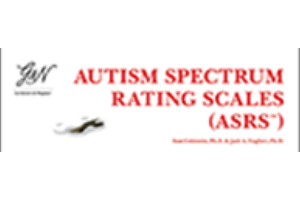Author:
Sam Goldstein, PhD, Jack A. Naglieri, PhD
Overview:
Multi-informant measure to identify symptoms, behaviors, and associated features of Autism Spectrum Disorders
Age Range:
2 - 18
Administration:
Paper-and-pencil
RTI Tiers:
RTI Level 3
Completion Time:
Full form: 20 minutes Short form: 5 minutes (15 items)
Scores/Interpretation:
ASRS Scoring Software or manual scoring
Publication Date:
2009
The first nationally standardized, norm-referenced ASD Rating Scale.
The ASRS provides the first nationally standardized, norm-referenced ASD Rating Scale. This multi-informant measure is designed to help you identify symptoms, behaviors, and associated features of Autism Spectrum Disorders (ASDs) in children and adolescents ages 2 to 18.
Use the ASRS to help:
- Support the diagnostic process
- Guide the development of intervention and treatment strategies
- Monitor responses to intervention and its effectiveness
- Behavioral Rigidity
- Sensory Sensitivity
- Attention/Self-Regulation (Full form for ages 2–5)
- Attention (Full form for ages 6–18)
- Social/Emotional Reciprocity
Administration
Using a five-point Likert rating scale, parents and teachers are asked to evaluate how often they observe specific behaviors in the child or adolescent. The full form contains 70 items for ages 2–5 and 71 items for ages 6–18. The short form, designed for ages2–18, contains 15 items.
Key areas measured:
- Social/Communication
- Unusual Behaviors
- Self-Regulation (Full form for ages 6–18)
- Peer Socialization
- Adult Socialization
- Atypical Language
- Stereotypy
Features & Benefits
- Items help assess DSM–IV–TR® symptom criteria for ASDs.
- Easy administration, scoring, and result interpretation.
- Excellent reliability and validity.
- Short form can be used for screening or treatment monitoring.
Scoring Options
Computerized scoring
Manual Scoring – Allows you to administer and score assessments by hand.





